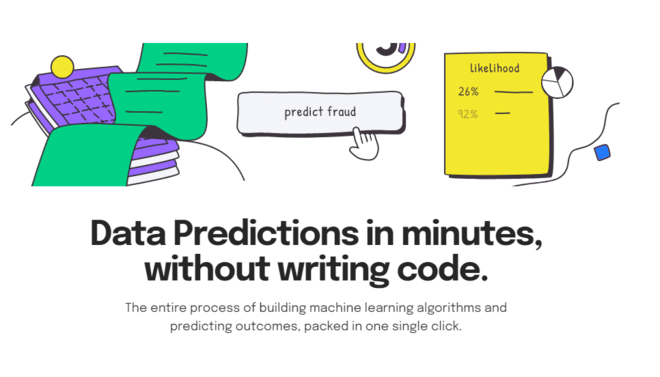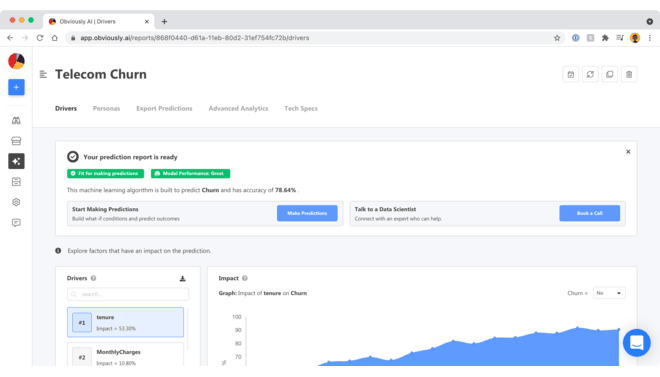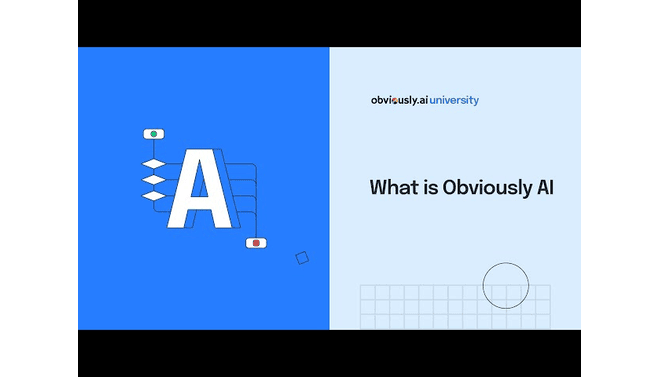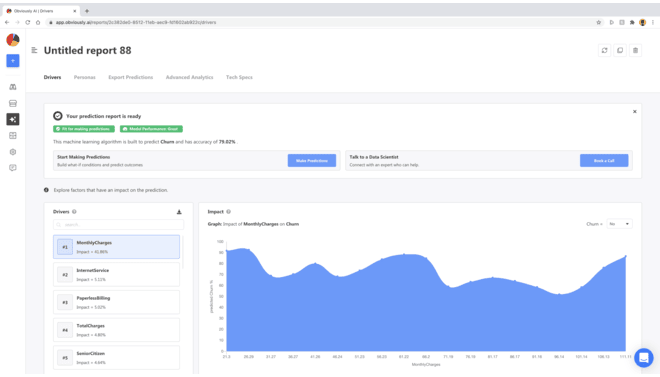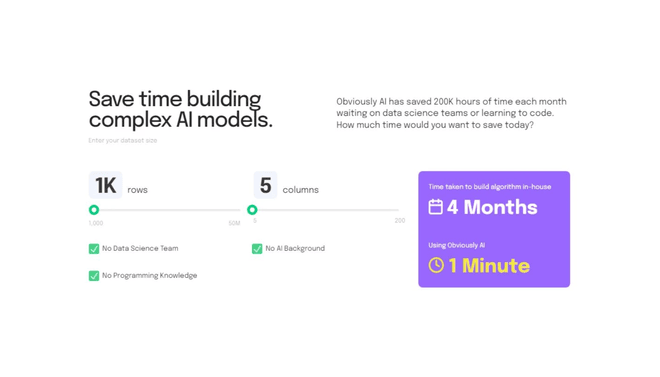Obviously AI is a modern, cloud-based Automated Machine Learning (AutoML) platform designed to democratize data science, enabling business users to instantly generate predictive models without writing any code.
Introduction
Obviously AI is a modern, cloud-based Automated Machine Learning (AutoML) platform designed to democratize data science, enabling business users to instantly generate predictive models without writing any code. Its mission is to make advanced analytical capabilities accessible to everyone from marketers and sales managers to financial analysts.
The core workflow involves simply uploading a structured data file (CSV, Excel) and selecting a target column to predict (e.g., “Will this customer churn?” or “What is the likelihood of fraud?”). The platform’s powerful engine automatically builds, trains, and tunes hundreds of machine learning models in minutes, delivering a clear, actionable prediction model with built-in interpretability.
This approach drastically reduces the cost and technical barrier associated with hiring data scientists or managing complex MLOps infrastructure.
No-Code AI
AutoML Engine
Prediction Platform
Data Interpretability
API Integration
Review
Obviously AI is known for its crucial success in democratizing predictive analytics. Its primary strength is the sheer simplicity of its no-code, rapid prediction pipeline, which allows non-technical teams to transform raw data into actionable models in minutes. The value lies not just in speed, but in the interpretability features that explain why a model made a decision, boosting user trust.
While the platform excels at general prediction tasks, the opacity of the automated algorithm (the “black box” nature of AutoML) limits fine-tuning for highly specialized, nuanced problems. For organizations that need quick, reliable, and accessible forecasting, however, Obviously AI is an indispensable tool that fundamentally shifts business strategy from reactive reporting to proactive prediction
Features
Instant Prediction
Generates a complete, trained predictive model in minutes after a user uploads a dataset and selects a target column.
Automated Feature Engineering
The platform automatically cleans, formats, and transforms raw data columns to maximize model accuracy.
Model Explainability
Provides clear, visual breakdowns (e.g., graphs, reports) showing which input features were the most important drivers for the model’s prediction.
Automated Model Selection
The AutoML engine tests dozens of algorithms (e.g., regression, classification trees) and automatically selects the highest-performing model for the user's dataset.
One-Click Prediction
Simplifies the forecasting process to just a few clicks: Upload Data -> Select Target -> Get Prediction.
Custom Integrations
Allows real-time prediction by connecting the model to operational systems, CRMs (Salesforce), or databases via an API.
Best Suited for
Marketing & Sales Teams
Ideal for predicting customer churn, conversion likelihood, and optimizing lead scoring.
Small to Midsize Businesses (SMBs)
Perfect for gaining sophisticated predictive insights without the overhead of a dedicated data science department.
Financial Analysts
Excellent for forecasting business metrics, predicting default risk, or analyzing operational trends.
Operations Teams
Great for predicting inventory needs, equipment failure, or staffing requirements.
Students & Educators
Useful for teaching core machine learning concepts and running quick, real-world data experiments.
Product Managers
A strong tool for modeling feature adoption rates or predicting user drop-off points in product flows.
Strengths
Democratizes data science by allowing non-technical users to build predictive models.
Generates a fully trained, accurate model and feature importance report.
Model explainability features build user trust by visually showing why a prediction was made.
API access allows for easy integration into business systems, enabling real-time, actionable predictions during transactions
Weakness
The platform is optimized for structured, tabular data and may struggle with highly unstructured, complex, or messy raw data sets.
The high cost for the Enterprise tier can be prohibitive.
Getting started with: step by step guide
The core usage process is designed for maximum simplicity, eliminating all programming and complex data preparation steps.
Step 1: Upload Data
The user uploads a structured data file (CSV, Excel) that contains historical information, including the column they wish to predict.
Step 2: Define Goal
The user is prompted to select the single target column they want the AI to forecast (e.g., “Subscription Status”).
Step 3: Instant Modeling
The AutoML engine automatically begins cleansing the data, selecting algorithms, and training the optimal predictive model.
Step 4: Review and Interpret
The model is generated in minutes. The user reviews its accuracy score and analyzes the Feature Importance report to understand which data points drove the predictions.
Step 5: Generate Predictions
The user submits new data (without the target column) via the UI or API, and the model generates instant forecasts (e.g., “This new lead has a 95% likelihood of converting”).
Frequently Asked Questions
Q: Do I need a background in data science or coding to use Obviously AI?
A: No. The platform is designed specifically for non-technical business users, allowing them to build predictive models instantly with a no-code interface.
Q: How accurate are the predictions?
A: The platform automatically selects the highest-performing model for your specific data and provides a transparent accuracy score before deployment. Prediction accuracy is ultimately dependent on the quality of the uploaded data.
Q: Can I integrate my prediction model into my CRM or website?
A: Yes, all paid plans support API integration, allowing your business systems (e.g., Salesforce, marketing automation) to send new data and retrieve real-time predictions.
Q: What is "Model Explainability"?
A: Model Explainability (or interpretability) is a feature that provides a visual report showing which input features (e.g., location, account age, last purchase amount) were the most important factors in the AI’s prediction.
Q: What kind of data file is required?
A: The tool works best with structured, tabular data in common file formats like CSV, Excel (.xlsx), or Google Sheets.
Q: Does the Free plan allow me to use the API?
A: Typically, API access is reserved for the paid Pro and Enterprise plans, as it is a core feature for commercial, real-time prediction workflows.
Q: Does the platform automatically handle missing or messy data?
A: Yes, the AutoML engine automatically performs data cleansing and feature engineering (imputation, normalization) to prepare your data for training, simplifying the data preparation phase.
Q: Can I predict numerical values (like revenue or cost)?
A: Yes, the platform supports both classification (predicting a category like “Yes/No”) and regression (predicting a numerical value like “future revenue” or “optimal price”).
Q: Is my data private?
A: Yes. The platform is designed for enterprise use, with the Enterprise tier offering advanced features like Single Sign-On (SSO) and the possibility of on-premise deployment to ensure proprietary data privacy.
Q: Does the model need new data to be trained manually each time?
A: No, once trained, the model can generate new predictions immediately. However, for continuous optimal performance, most users periodically retrain the model with updated historical data.
Pricing
Obviously AI operates on a subscription model tiered primarily by the volume of data processed (rows/month) and the need for enterprise features. Pricing is structured for continuous, scalable use, reflecting its business utility as a predictive layer over an organization’s operational data.
Basic
$0/month
Limited Rows/Uploads & Basic predictions, single user, public model sharing.
Standard
$1000/month
High Row Volume (e.g., 500K Rows/mo) | Unlimited Models, Model Explainability, Priority Support, Custom Integrations.
Pro
$3000/month
Custom Pricing | Unlimited Scale | SSO/SAML, Advanced Data Security/Compliance (GDPR, CCPA), On-Premise Deployment.
Alternatives
DataRobot
A leading enterprise AutoML platform, offering highly sophisticated feature engineering and model management for data science teams.
Google Cloud Vertex AI
Google's comprehensive platform for building, deploying, and scaling machine learning models with strong MLOps support.
Microsoft Azure Machine Learning
Microsoft's cloud-based environment for enterprise-grade ML development and operations.
Share it on social media:
Questions and answers of the customers
There are no questions yet. Be the first to ask a question about this product.

Obviously AI
Sale Has Ended

